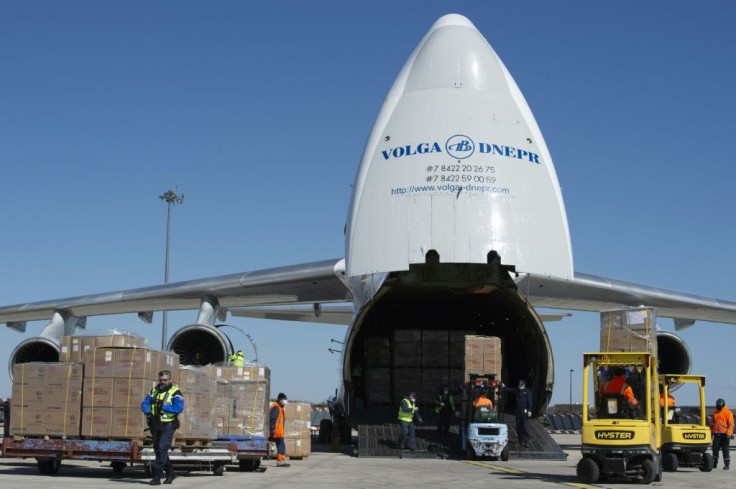Solidarity? When It Comes To Masks, It's Every Nation For Itself

From government stock seizures to sales to the highest bidder on airport tarmacs, the hunt for face masks amid the coronavirus outbreak has become a global free-for-all where the rules of fair play no longer apply.
Officials worldwide were caught short by the crisis with most countries unable to manufacture the millions of masks needed every day for health workers alone.
So nearly everyone is turning to China and other Asian producers, and some players are doing whatever it takes to get their hands on the coveted stocks.
"Procurement markets for COVID-19 supplies are collapsing, and the traditional means of competition and transparency are really not being used," Christopher Yukins, a law professor at George Washington University said during a videoconference Thursday.
Even among Western countries that are nominally allies, accusations of unscrupulous behaviour have underscored the mounting anxiety over mask shortages.
The president of the Ile-de-France region encompassing Paris, Valerie Pecresse, said this week that a shipment of masks ordered for her hard-hit department was snatched at the last minute by "Americans who made a higher bid".
"The Americans pay cash sight unseen, which obviously can be more tempting for people just looking to make money off the entire world's distress," she said.
Pecresse offered no details on the purported American buyers, but officials in at least two other French regions also claimed US buyers swept in to acquire their Chinese orders -- in one case on the airport runway just as the plane was about to take off.
In Washington, a senior administration official told AFP "the United States government has not purchased any masks intended for delivery from China to France."
The buyers could well have been private firms, or middlemen working on behalf of individual American states.
Canadian Prime Minister Justin Trudeau said Thursday he was "concerned" by a report that a mask order came in smaller than expected after part of it was sold to "a higher bidder" -- a not-so-subtle reference to the US.
"We understand that the needs in the US are very extensive, but it's the same in Canada, so we have to work together," Trudeau said.
Yet it appears unlikely that cooperation is in the cards.
Jean-Sylvestre Mongrenier at the Thomas More Institute, a Franco-Belgian think-tank, warned of "endemic insecurity between nations, or even a state of anarchy if the international public order disintegrates".
"But outbidding on a mask delivery is more a case of competing for access to resources. It's unfortunate but it's not going to spark an outbreak of hostilities."
Yet the competition can be "frightening," as recounted by Ukrainian lawmaker Andriy Motovylovets after a trip to China last month to secure a mask shipment.
"Our consuls who go to factories find their colleagues from other countries (Russia, USA, France) who are trying to obtain our orders," he wrote on Facebook.
"We have paid upfront by wire transfer and have signed contracts. But they have more money, in cash. We have to fight for each shipment."
And since only a handful of Chinese mask producers have export licenses, most have to use middlemen to sell to foreign buyers, vastly increasing the number of intermediaries in a seller's market.
"We're dealing with direct negotiations, over-the-counter deals, which are pragmatic during health emergencies but which often go hand-in-hand with favouritism, misappropriations and price gouging," Laurence Folliot Lalliot, a public law professor in Paris, wrote in French daily Le Monde.
In Slovakia, Peter Pellegrini, prime minister until just a few days ago, said last month his government learned the hard way that when it comes to masks, cash is king.
"We were already preparing cash worth 1.2 million euros ($1.3 million) in a suitcase. We planned to use a special government flight and go get the masks" from a Chinese supplier, Pellegrini told a Slovakian TV channel.
"However, a dealer from Germany came there first, paid more for the shipment, and bought it," he said.
Even within the European Union, tensions have prompted some governments to seize equipment destined for other countries.
Czech authorities last month took thousands of masks intended for Italian hospitals from "traffickers", only to find out later the masks had been donated by China.
And French weekly L'Express reported that Paris, which has requisitioned all masks amid the shortage, seized stock from Swedish producer Molnlycke that was headed for Spain and Italy.
"We expect France to promptly cease the requisition of medical equipment and do what it can to ensure that supply chains and the transportation of goods are secured," Sweden's foreign ministry said in a statement to AFP on Friday.
"The common market has to function, particularly in times of crisis," it said.
But as the COVID-19 outbreak spreads, governments may find it hard to resist strongarm tactics, possibly even employing surreptitious means.
France's Le Figaro daily reported last month that Israel's Mossad spy agency was enlisted to secure coronavirus testing kits from an unidentified foreign country.
© Copyright AFP 2024. All rights reserved.





















